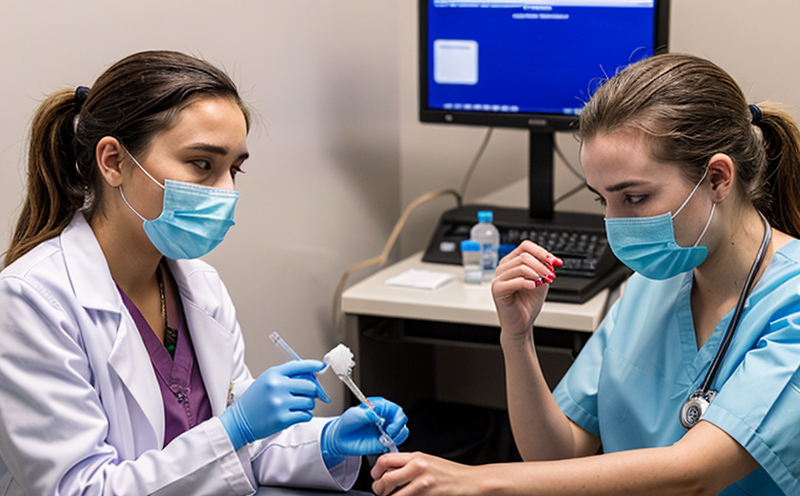ASTM E2871 Clinical Rapid Microbial Testing in Healthcare Samples
The ASTM E2871 standard has revolutionized the field of clinical microbiology testing by introducing rapid methods to detect and identify pathogens. This service is particularly critical in healthcare settings where timely diagnosis can significantly impact patient outcomes.
The ASTM E2871 method enables laboratories to perform microbiological analyses on healthcare samples with greater speed and accuracy compared to traditional culture-based techniques. This rapidity allows for quicker identification of infectious agents, facilitating early interventions that are crucial in managing outbreaks and preventing nosocomial infections.
One of the primary advantages of ASTM E2871 is its ability to minimize specimen handling time, which reduces the risk of contamination and cross-contamination between samples. Additionally, it streamlines the workflow by integrating sample preparation directly into the testing process, thus enhancing efficiency in busy clinical environments.
The standard also emphasizes the importance of quality assurance through standardized procedures and reagent specifications. This ensures consistent results across different laboratories, which is essential for maintaining high standards of patient care.
ASTM E2871 supports a wide range of healthcare samples, including but not limited to blood cultures, wound swabs, and respiratory specimens. The method uses advanced molecular biology techniques such as nucleic acid amplification tests (NAATs) which can detect even low levels of microbial DNA or RNA.
The ASTM E2871 procedure typically involves several key steps: sample collection, processing, nucleic acid extraction, amplification using real-time PCR technology, and finally analysis to determine the presence and type of pathogen. The entire process is designed to be completed within hours rather than days, which can greatly influence treatment decisions.
For quality managers and compliance officers in healthcare facilities, adopting ASTM E2871 ensures that your laboratory meets stringent international standards for rapid microbial testing. This not only enhances the reliability of diagnostic results but also contributes to better patient safety practices by enabling faster responses to potential health threats.
- Integration with existing lab workflows: ASTM E2871 is compatible with many automated systems, making it easier to incorporate into current laboratory operations.
- Precision and accuracy: The method provides highly specific and sensitive detection of pathogens, reducing the likelihood of false positives or negatives.
In summary, implementing ASTM E2871 in your healthcare facility will help you stay ahead of emerging trends in microbiology testing. By providing rapid, accurate results, this service supports evidence-based decision-making processes that ultimately lead to improved patient care and outcomes.
Why It Matters
The timely application of ASTM E2871 is vital for several reasons within the healthcare sector:
- Patient Safety: Early detection and treatment can prevent complications from infections, reducing hospital stays and improving recovery times.
- Outbreak Management: Rapid identification allows for swift containment strategies, minimizing spread of pathogens in both hospitals and communities.
- Resource Optimization: Efficient use of laboratory resources leads to cost savings while maintaining high standards of care.
- Regulatory Compliance: Adhering to international standards ensures that your facility meets regulatory requirements, enhancing its reputation.
In essence, ASTM E2871 plays a pivotal role in safeguarding public health and ensuring the provision of quality healthcare services.
Benefits
The adoption of ASTM E2871 offers numerous benefits to laboratories and healthcare providers:
- Improved Diagnostic Accuracy: The method provides highly specific results, reducing diagnostic uncertainties.
- Enhanced Efficiency: Shortened processing times lead to faster turnaround times for test results.
- Cost Effectiveness: By optimizing resource utilization and minimizing errors, the overall cost of operations is reduced.
- Patient Satisfaction: Faster diagnosis translates into quicker treatment plans, leading to higher patient satisfaction levels.
Beyond these practical advantages, ASTM E2871 also fosters a culture of continuous improvement within laboratories by promoting adherence to best practices and international standards.
Competitive Advantage and Market Impact
The implementation of ASTM E2871 provides significant competitive advantages:
- Enhanced Reputation: Compliance with international standards enhances the reputation of healthcare facilities, attracting more clients.
- Increased Efficiency: Faster testing times reduce operational costs and improve turnaround times.
- Better Outcomes: Improved patient care through timely interventions can lead to better health outcomes and higher satisfaction rates.
In the competitive healthcare market, laboratories that adopt ASTM E2871 stand out for their commitment to quality and innovation. This not only attracts more business but also ensures long-term sustainability by maintaining high standards of service delivery.





